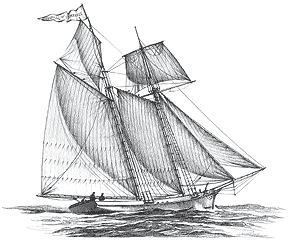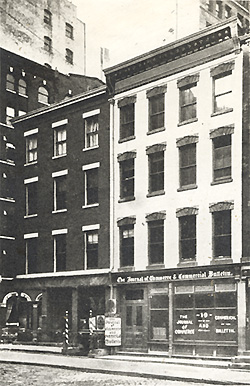
![]()
BY PETER T. LEACH
 "The proper way to peruse The Journal of Commerce is to be dressed in your best work-day business suit with both feet planted firmly on the floor. God intended it that way. It was not meant for fun reading. Not even its most rabid follower would make that claim. Not even the general traffic manager at GM would want it around while recovering from a prostate or even while sunning himself poolside at a lush Caribbean hotel. Ditto for anyone who wanted to relax on a cold night in Boston. Today's Journal of Commerce is known as a right of center conservative - a hard-core free enterpriser - a paper only a publisher could love. But in its early days, it was a scrapper. In the rough-and-tough, horse-and-buggy era into which it was born, it was a vibrant force from the beginning."
"The proper way to peruse The Journal of Commerce is to be dressed in your best work-day business suit with both feet planted firmly on the floor. God intended it that way. It was not meant for fun reading. Not even its most rabid follower would make that claim. Not even the general traffic manager at GM would want it around while recovering from a prostate or even while sunning himself poolside at a lush Caribbean hotel. Ditto for anyone who wanted to relax on a cold night in Boston. Today's Journal of Commerce is known as a right of center conservative - a hard-core free enterpriser - a paper only a publisher could love. But in its early days, it was a scrapper. In the rough-and-tough, horse-and-buggy era into which it was born, it was a vibrant force from the beginning."
- Seymour Frank, 1974
The 1800's
The gentle swells rocked the schooner as it pulled alongside the French square-rigger that anchored in the shallow waters off Sandy Hook, N.J., awaiting the high tide that would let it sail over the unmarked shoals into New York harbor. A young man crouched at the schooner’s rail, poised to lunge for the Jacob’s ladder the crew of the French ship was already lowering over the gunwales.
It was early October 1830, and the young man climbing onto the anchored ship was a reporter for The Journal of Commerce. He was after the latest news from the Continent and the vessel’s cargo manifests. If he could get them back into port before any other reporter could reach the French ship, his paper would have another exclusive on the latest news from Europe.
And the New York businessmen who would be eagerly reading the paper would get an early look at the kind of cargo the ship would be bringing in for auction to the highest bidders on the waterfront.
The schooner that pulled alongside the French vessel, inbound from Le Havre, was called the Evening Edition, the newest of two so-called news boats owned by the newspaper. Their shallow draft and speed enabled them to skim over the shoals that ringed the harbor and easily beat the rowboats maintained by rival newspapers back into Lower Manhattan.
| From Morse to the new Millennium, The Journal of Commerce has changed with the times. |
When the Evening Edition slid into its berth near the foot of Manhattan that afternoon, the reporter raced up the gangplank and back to his paper’s editorial offices at 91 Wall Street, just off Water Street.
The story he had scribbled on his notepad would give New Yorkers their first news of the astounding coup in France. King Charles X had abdicated in the wake of street riots in Paris that marked the Revolution of 1830. The story reported that Louis-Phillippe, the “citizen king,” had assumed the throne.
 |
| After its acquisition of the Commercial Bulletin in 1893, the JoC was published at 19 Beaver Street in Manhattan, opposite the New York Produce Exchange. |
Of even more interest to the business readers of The Journal of Commerce were the cargo manifests that would appear in the paper’s inside pages. For the ship was carrying French silks, fine woolens, and casks of Bordeaux wines and cognac. The columns of cargo listings would give those readers time to prepare their bids for the merchandise they would buy at auction when the vessel would finally pull into its East River berth the next day.
The “scoop” published by The Journal of Commerce in its special “extra” edition that day in 1830 was one of many the paper gained through its fleet of news boats. The boats characterized the paper’s commitment to being the fastest and most accurate of New York’s many papers. Over the coming years, the JoC would adapt its methods of news-gathering to the continuing revolutions in technology that would transform the way papers gathered the news.
Willingness to embrace change has enabled The Journal of Commerce, which is 175 years old this year, to survive while countless other publications have failed. Change is the very nature of the world The Journal of Commerce has covered since the day it was born on Sept. 1, 1827.
Over the years The Journal of Commerce has been a respected voice on subjects as diverse as banking, commodities, insurance, energy and transportation. Today the emphasis of the weekly Journal of Commerce newsmagazine and its breaking-news website, The Journal of Commerce Online, is on international trade, transportation and logistics — subjects that descend directly from the paper’s coverage early in its history.
International trade has been at the heart of the JoC’s coverage since the publication was launched by a group of upright New York businessmen as part of a war on sin. In fact, it was the unbending religious convictions of its founders that steered the paper into becoming the young nation’s leading maritime and business journal.
Peter T. Leach, editor of The Journal of Commerce from 1978 to 1981, is a writer based in Saratoga Springs, N.Y.
The 1800's: 1 2 3 4 5 6 7 8 9 10 next >